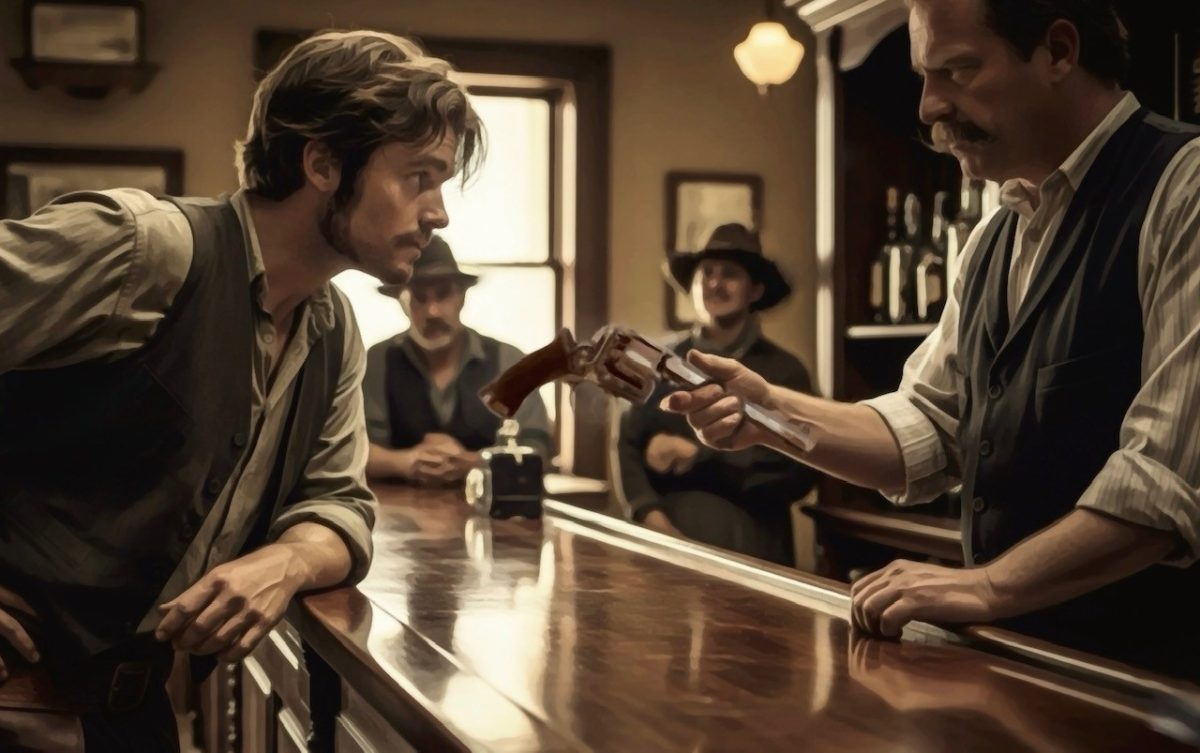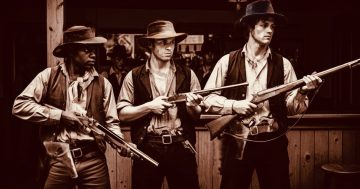
When Arthur Dunn attempted to buy a pistol in a Junee bar in 1870, things did not go according to plan. Photo: Created using AI and Photoshop.
In 1870, just weeks after the notorious Captain Thunderbolt was gunned down in Uralla, a loud-mouthed young man made a failed attempt to launch his own bushranging career in the Riverina.
By the late 1860s, the bushranging scourge across NSW and Victoria had begun to decline. The gold rush was over and the police had started to take the upper hand with the likes of Frank Gardiner, Ben Hall, Dan Morgan, Blue Cap and the Clarke Brothers either dead or in prison.
Young Arthur Dunn was not the sharpest tool in the shed and liked to boast that he was the cousin of the murderous highwayman John Dunn, who had ridden with Ben Hall and John Gilbert.
The late bushranger was indeed known to have family northeast of Junee and it was during a visit to his grandfather near Murrumburrah in 1865 that Gilbert had been killed by the police.
On 28 June, 1870, The Wagga Wagga Advertiser reported that the 23-year-old Arthur Dunn had entered the Inn at Junee Reefs carrying a swag.
After knocking back three or four drinks at the bar, he asked the proprietor, William Johnson, whether he could purchase a revolver.
When the suspicious innkeeper asked what he intended to do with it, Dunn replied that he needed it to “get money with”.
Dunn proposed that if Johnson let him borrow the revolver for a day, he would take “to the roads” and return to pay Johnson £15 for the weapon.
“Do you have any mates with you?” Johnson asked, to which he confessed: “Yes. Two.”
Johnson then informed the would-be thief that “all the money ever made by bushranging” would not buy a revolver from him for such a purpose.
Realising that he had misjudged the innkeeper and shared a little too much of his intentions, Dunn declared coolly that he “need not say any-thing of what has occurred between us; it cannot do you any good to do so, and might do you some mischief”.
But the doughty Johnson was not to be intimidated, warning that it was his duty to apprehend the “young aspirant for the gallows” and he seized hold of him.
As the pair grappled, Dunn managed to free himself and rushed outside with Johnson close behind and calling to two men nearby to help.
Dunn was soon captured and secured in the innkeeper’s house. An inspection of his swag revealed a white gutta-percha raincoat that had been stolen from local man Thomas Kirkpatrick’s wagon while he was camped at North Wagga. Dunn’s clothes and boots were also recognised as having been among the goods stolen, and the prisoner was tied up overnight and escorted to Wagga the following day.
“Considerable excitement was created on Monday afternoon by the entrance into Wagga Wagga of two conveyances occupied by armed men,” The Advertiser reported.
“A young desperado-looking prisoner, firmly secured by good hempen rope, occupied a place alongside one of his armed escort in the foremost vehicle.”
Placed in the lockup overnight, Dunn attempted to dispose of some of the evidence. Breaking the handle off a pot in his cell, the young thief used it as a knife to shred the stolen trousers and cut up the leather boots before placing the pieces into the “night-tub”.
While the fragments were deemed beyond identification, the distinctive rubberised raincoat remained intact and the prisoner was brought before the bench, where he did himself few favours by boasting about his bushranging pedigree.
“The prisoner, giving the name of Arthur Dunn, and avowing himself to be a cousin of the bloodthirsty scoundrel who, as the last of Gilbert and Hall’s gang, forfeited his young and misspent life upon the scaffold about two years ago,” The Advertiser wrote.
“The prisoner certainly bears a strong likeness to the photograph of the late bushranger.”
Dunn was committed to trial and the judge complimented Johnson for “so promptly cutting short the career of a young desperado, whose path in a very short time might have been tracked by the blood of murdered victims”.
As the dimwitted bushranger was led from the court by a pair of constables, he made one last attempt to escape, slipping their grasp and bolting for the gate, where he was “collared by constable McElligott and marched off to the gaol”.
One month later, in July 1870, he was found guilty of larceny.
Original Article published by Chris Roe on Region Riverina.








